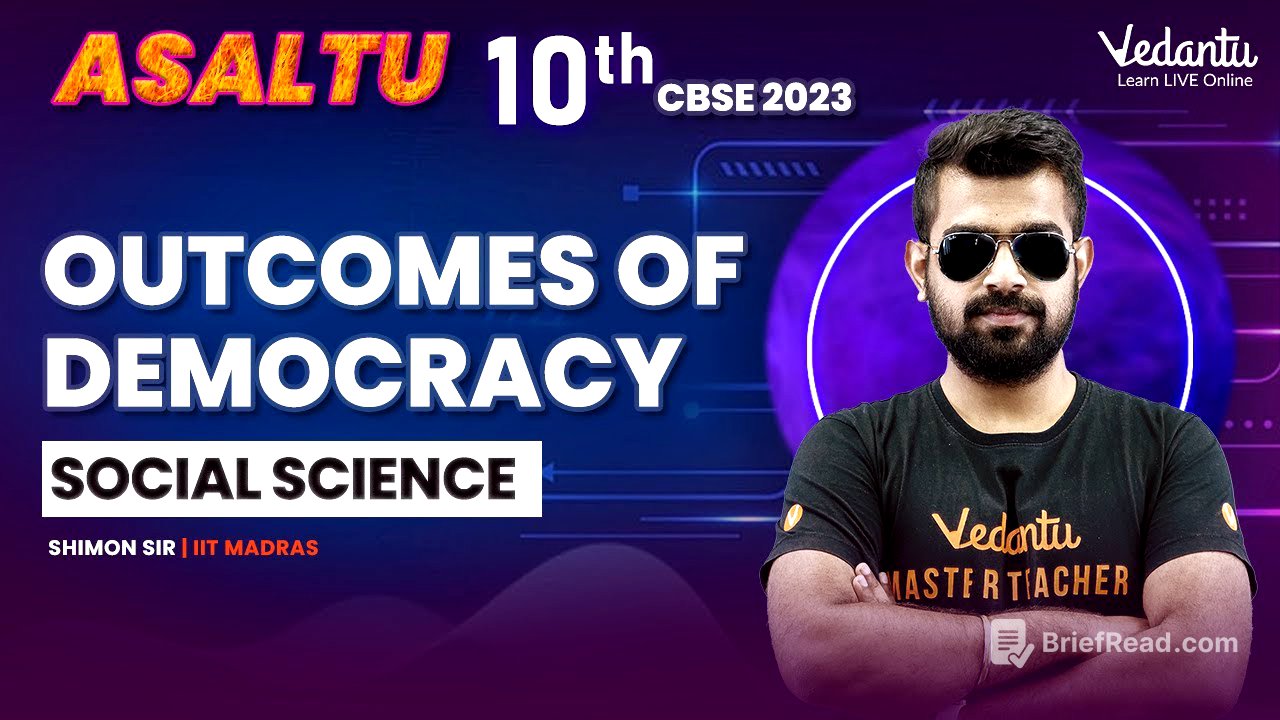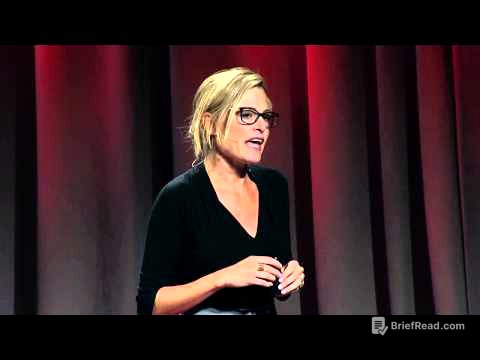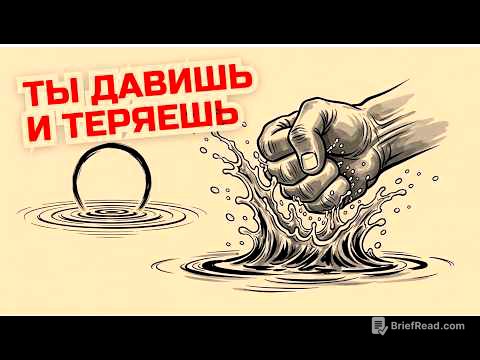TLDR;
This video explores the outcomes of democracy, comparing it to other forms of government. It examines democracy in principle versus in practice, focusing on accountability, responsiveness, and legitimacy. The video also addresses economic growth, inequality, social diversity, and the dignity and freedom of citizens within a democratic framework.
- Democracy is assessed by its outcomes, including accountability, responsiveness, and legitimacy.
- While democracy promotes equality and dignity in principle, its practical application often falls short, particularly in economic equality.
- Democracy is better suited to accommodate social diversity and resolve conflicts compared to non-democratic regimes.
Introduction to Democracy's Outcomes [3:03]
The video begins by questioning how to assess the outcomes of democracy, encouraging viewers to think critically about what they've learned. It establishes that democracy is "by the people" and one of the largest democracies in the world. Democracy is presented as a better form of government compared to dictatorships, military rule, and monarchies, particularly in principle.
Democracy in Principle [6:51]
In principle, democracy promotes equality among citizens and enhances individual dignity. It improves the quality of decision-making, although decisions may be slower compared to dictatorships where leaders are not accountable. Democracy provides a method to resolve conflicts through negotiation and allows for the correction of errors.
Democracy in Practice: Dissatisfaction and Reality [11:26]
Despite its ideals, most people are dissatisfied with democracy in practice. Over a hundred countries claim to be democratic, with constitutions, elections, and guaranteed rights. However, democracies differ in their social, economic, and cultural achievements, leading to varied outcomes. While democracy can create conditions for achieving goals, citizens must utilise these opportunities.
Accountability, Responsiveness, and Legitimacy [17:56]
The basic outcome of democracy is a government that is accountable, responsive, and legitimate. Citizens should participate in decision-making processes. Accountable means the government is responsible and must answer for its actions. While democratic governments may be slower in decision-making due to procedures, the decisions are often better due to scrutiny. Transparency, enabled by the right to information, is crucial for accountability.
Fair Elections, Open Debates, and Transparency [26:15]
To measure democracy's outcomes, one should look for regular, free, and fair elections, open public debates, and the right to information. However, democracy has a mixed record, sometimes failing to provide equal chances to everyone or subjecting every decision to public debate. Democratic governments may not always share information, falling short of expectations.
Corruption and People's Expectations [29:26]
It is reasonable to expect a democratic government to be attentive to the needs of the people and corruption-free. However, the record of democracies is not always impressive, and they are not free from corruption. Despite corruption, it cannot be the sole reason to reject democracy, as non-democratic regimes also have corruption.
Legitimacy and Public Support for Democracy [32:27]
Democracy is a people's government and hence legitimate because people form the government. There is massive support for democracy compared to dictatorships. The ability of democracy to generate its own support is a significant outcome. Most of South Asia prefers democracy, except for Pakistan.
Economic Growth in Democracies vs. Dictatorships [34:21]
Surprisingly, from 1950 to 2000, dictatorships showed more economic growth than democracies. Economic growth depends on factors like population and global situation. Rejecting democracy solely based on economic growth is not justified, as other factors affect it.
Inequality and Poverty [38:36]
The unfair distribution of income is a concern, with the working class and poor often being the ultimate losers. Data from 1950 to 2000 shows a higher growth rate in dictatorial regimes compared to democracies. In many countries, the rich take a disproportionate share of the wealth, while the bottom 20% receive very little.
Political vs. Economic Equality [43:12]
Democracies are based on political equality, but often fail in reducing economic inequality. The gap between the rich and the poor is widening. A small number of ultra-rich enjoy a disproportionate share of income, while those at the bottom have declining incomes.
Economic Inequality and Government Neglect [46:09]
Democracies are not very successful in reducing economic inequality and sometimes turn a blind eye to poverty. In Bangladesh, more than half the population lives in poverty. The poor often depend on the rich for basic necessities.
Accommodation of Social Diversity [48:00]
Democratic governments should lead to peaceful and harmonious life among citizens and accommodate various social divisions. Democracy is best suited to accommodate different social groups and resolve conflicts, but it must fulfill two conditions. It is not just rule by majority opinion, and the majority must always work with the minority.
Majority vs. Minority Rule [51:43]
Majority and minority opinions are not permanent, and they should work hand in hand. Rule by majority should not become rule by the majority community. Democracy remains democracy only as long as every citizen has an equal chance to be in the majority at some point.
Dignity and Freedom of Citizens [55:24]
Democracy is the best form of government for dignity and freedom of citizens. Respect and freedom are the basis of democracy. Democracies worldwide have recognised this, at least in principle. Women have fought for their freedom and are now included in democratic processes.
Equal Status and Opportunities [58:43]
Democracy in India has strengthened the claims of disadvantaged and discriminated castes for equal status and opportunities. Ordinary citizens value their democratic rights, which are absent in non-democratic regimes. People believe their vote makes a difference. Democracy is constantly tested, doubted, and critiqued, leading to constant improvement.









